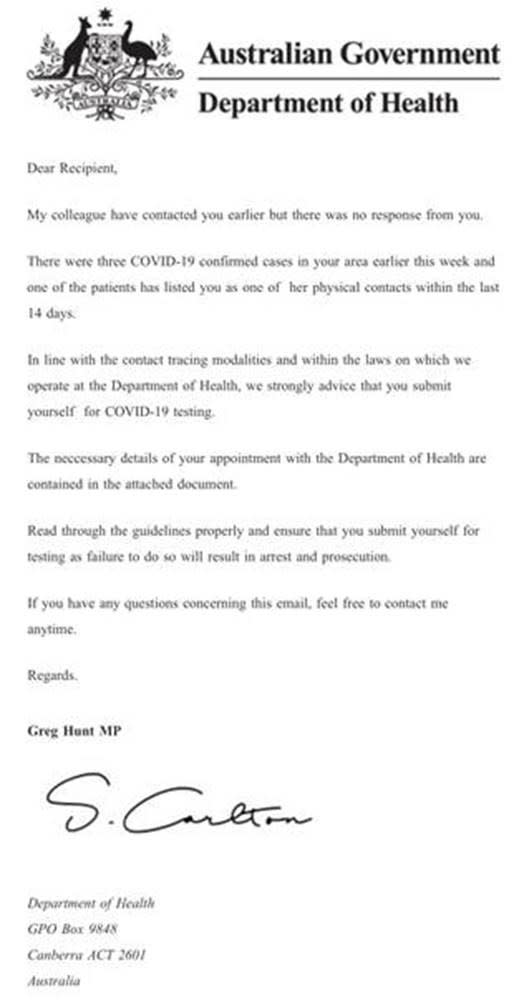How scammers are using the coronavirus to target Australians
Since the start of the coronavirus pandemic, thousands of people have been hit with scams relating to the virus, exploiting concerns such as financial stability and healthcare.
Scamwatch, run by the Australian Competition and Consumer Commission’s (ACCC), tries to help Australians recognise scams, so people don’t fall victim to them.
Scammers have been using the COVID-19 pandemic to their advantage, preying on people from all over Australia, Scamwatch warns.
Since the start of the pandemic, Scamwatch has received more than 3600 reports of scams mentioning the coronavirus and more than $2,240,000 has been lost.

“Scammers are using the spread of coronavirus to exploit and play on the fears of all consumers,” an ACCC spokesperson told Yahoo News Australia.
“Scammers are doing things such as falsely selling coronavirus-related products online, and using fake emails or text messages to try and obtain personal data.”
Who is most likely to be scammed?
According to the ACCC spokesperson, people in NSW have recorded more financial losses than people in other parts of Australia.
Since the start of the pandemic, residents in NSW have reported 1189 scams and a loss of more than $981,000.
However, given the nature of these scams being online or through text messages, no one is safe.
As for age, there is one demographic which has reported more losses during the pandemic and one gender is particularly harder-hit by financial scams.
“People aged 35-44 have reported more losses than any other age bracket with over $626,000 in losses and 556 reports,” the spokesperson said.
“Male reporters have reported higher financial losses with 1685 reports and over $1.2 million in losses, compared with 1892 reports submitted by women, and over $1.19 million in losses.”
Despite this, there are things people can do to prevent being scammed.
What scams to look out for
“Scammers are pretending to be well-known businesses and government agencies providing information on COVID-19 through text messages and emails ‘phishing’ for your information,” the ACCC spokesperson said.
Scamwatch advises these emails and text messages may contain “malicious” links or attachments which are designed to potentially steal your information.
On their website, Scamwatch has provided examples of what these scams might look like and how they might seem convincing.
One example was sent via email and it is a letter signed by Minister for Health Greg Hunt and advises the recipient of the email has been in contact with one person who has tested positive for the coronavirus.

The email also says there is a link which contains the “necessary details of your appointment with the Department of Health”, while other examples provided show text messages from “GOV” or “MyGov”, which is quite deceiving.
However, it’s not just government agencies scammer pose as, some might pretend to be businesses or banks, travel agents, insurance providers and telco companies.
Coronavirus Victoria: 'Awful' scam targeting residents in lockdown
'Biggest ever seen': How to stay safe from coronavirus scams
Scams can also be shared across social media. In May, several people on social media brought a scam to Woolworths’ attention. The post shared by several people claimed people could score $200 simply by sharing a link.
The post was not associated with Woolworths and the supermarket advised not to click the link as the scammers could “potentially receive financial or personal information from you” by doing so.
“The best way to detect a fake trader or social media shopping scam is to search reviews before buying,” the spokesperson said.

What to do if you think someone is trying to scam you
The advice from Scamwatch is to not click any of the links in these sorts of email and texts, just to be safe.
Instead, go directly to the website yourself through your internet browser.
“Don’t click on links in text/social media messages or emails, even if it appears to come from a trusted source,” the spokesperson suggests.
“Be wary of sellers requesting unusual payment methods such as upfront payment via money order, wire transfer, international funds transfer, preloaded card or electronic currency, like Bitcoin.
“Never respond to unexpected messages and calls that ask for personal or financial details, even if they claim to be a from a reputable organisation or government authority — just press delete or hang up.”

Scammers may also try to hack into your devices, so it is important to never allow a stranger to have remote access to your computer, even if someone claims to be from a telco company.
Scamwatch also says it is important to inform those close to you about scams – talk to family, friends and colleagues about scams, to prevent them from falling victim to a malicious scam.
It’s also worthwhile having a conversation with your bank so you know how to best protect your financial information and the steps you will need to take if you are scammed.
Do you have a story tip? Email: newsroomau@yahoonews.com.
You can also follow us on Facebook, Instagram and Twitter and download the Yahoo News app from the App Store or Google Play.





